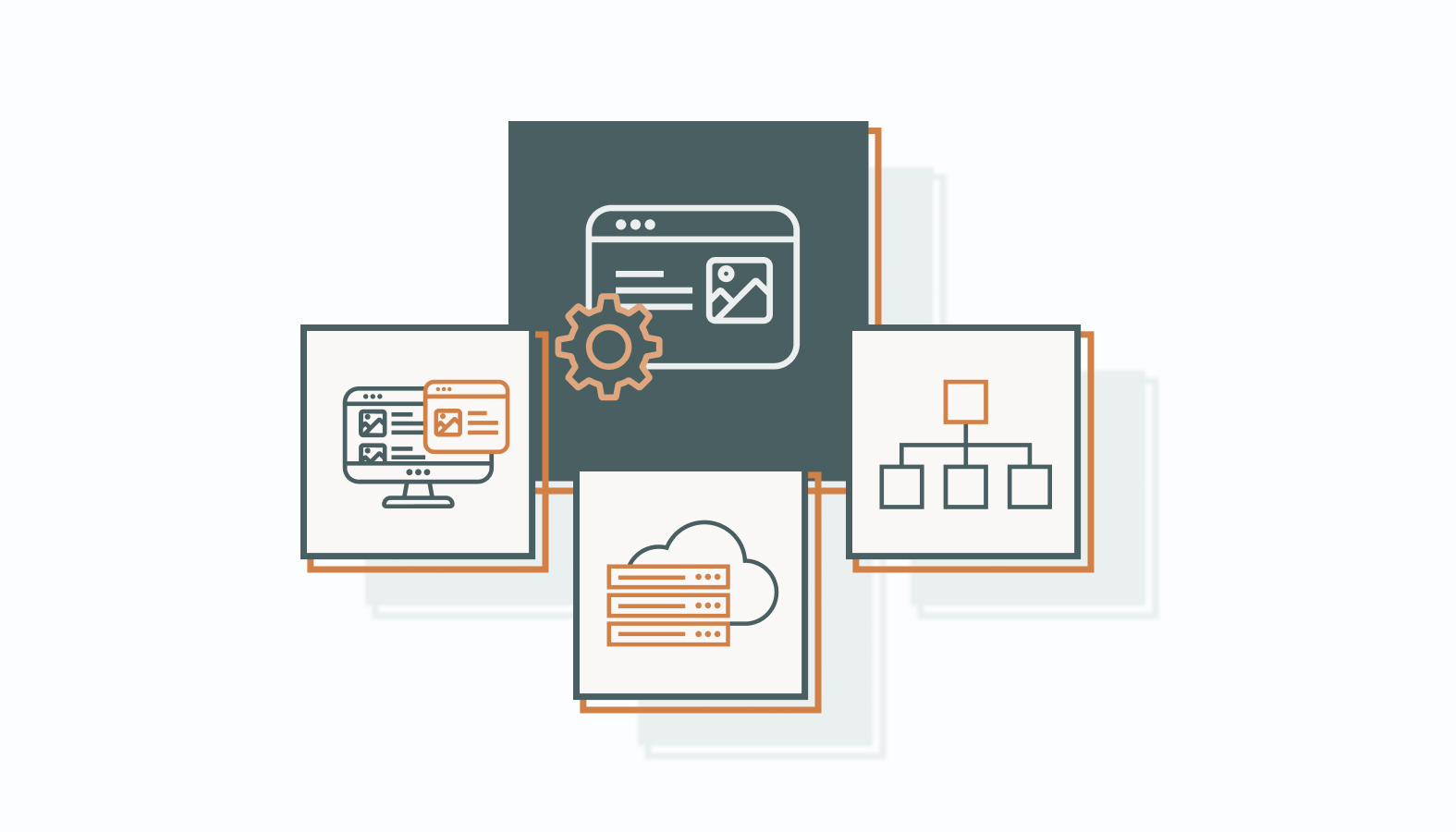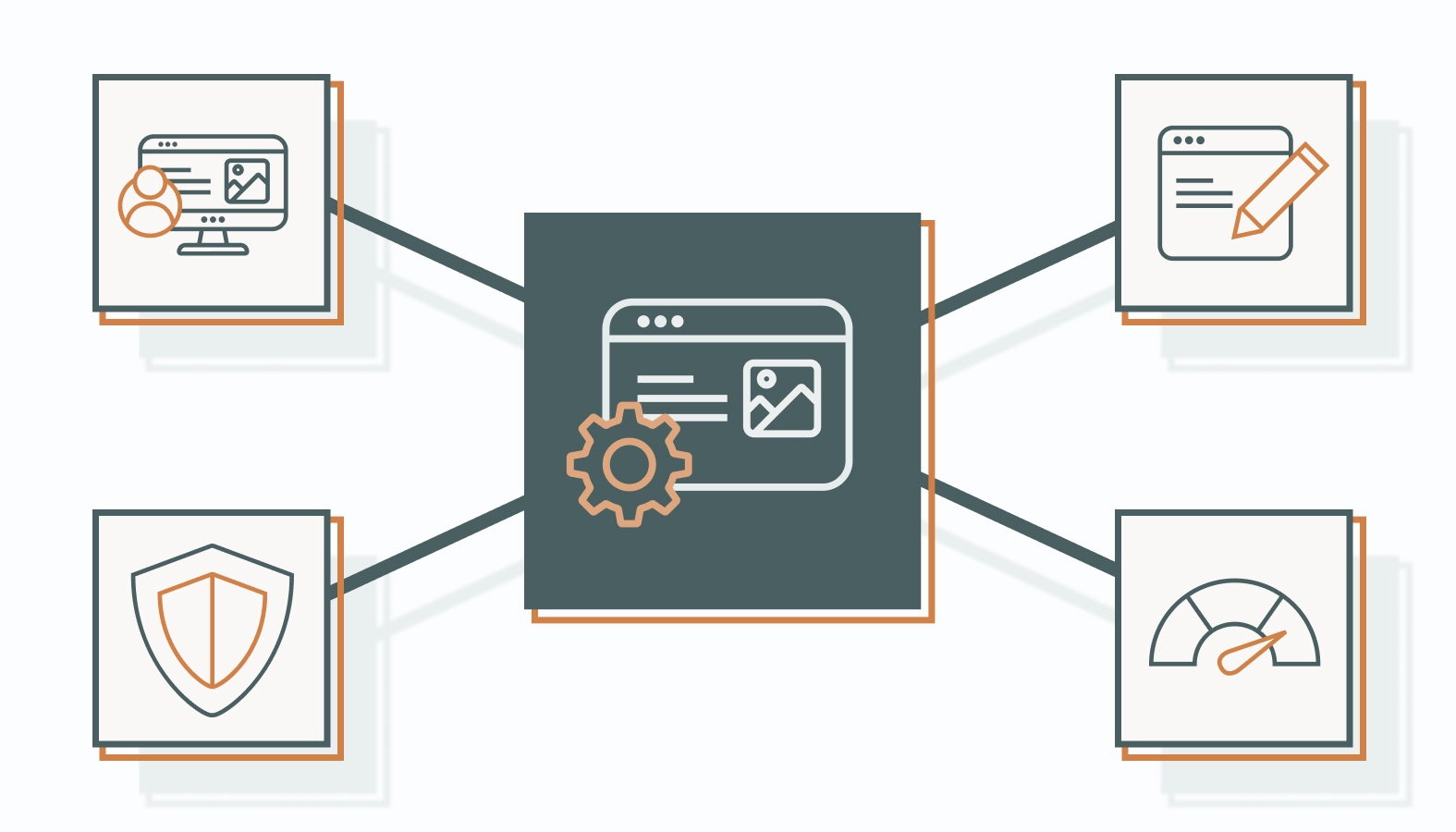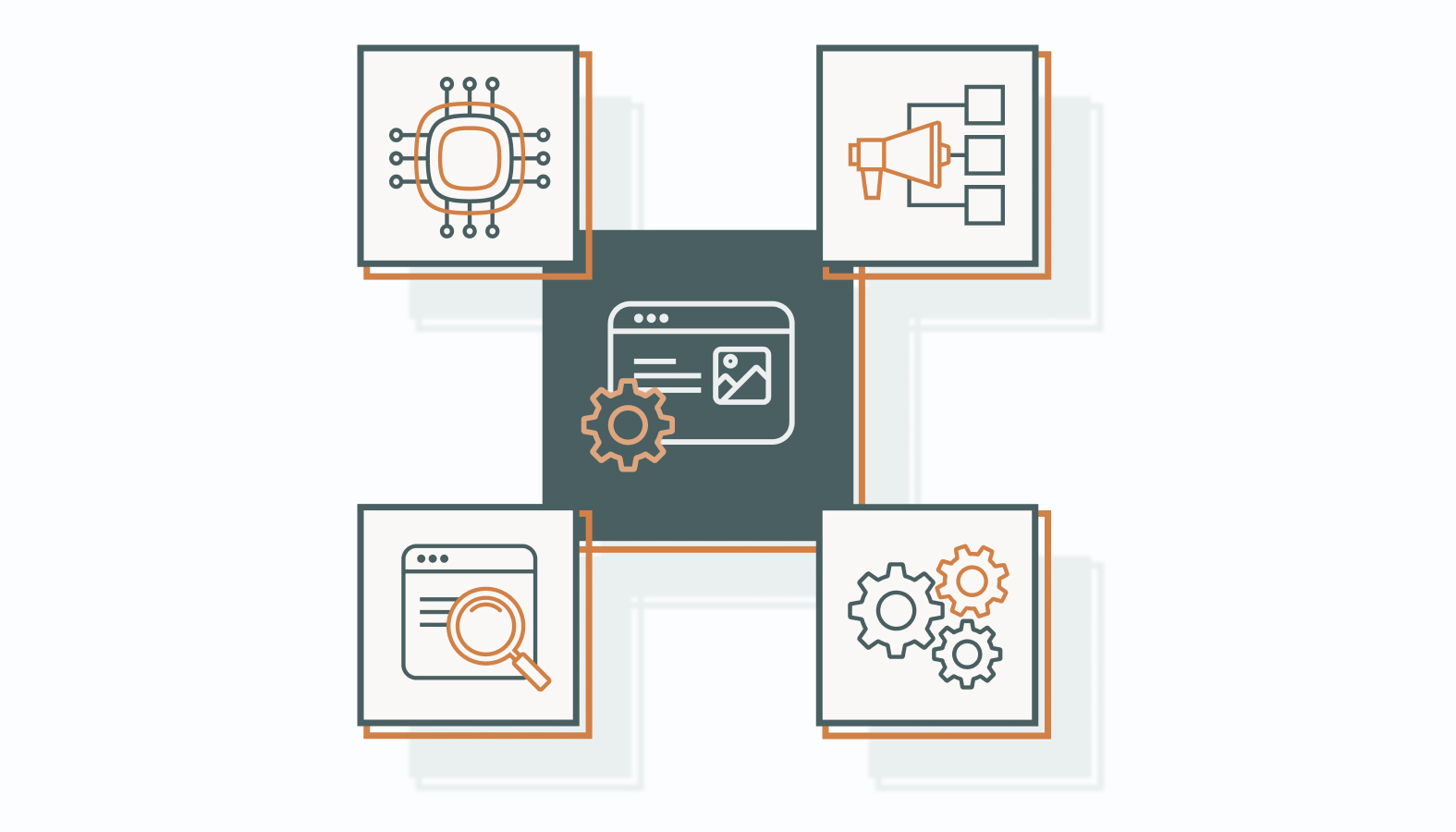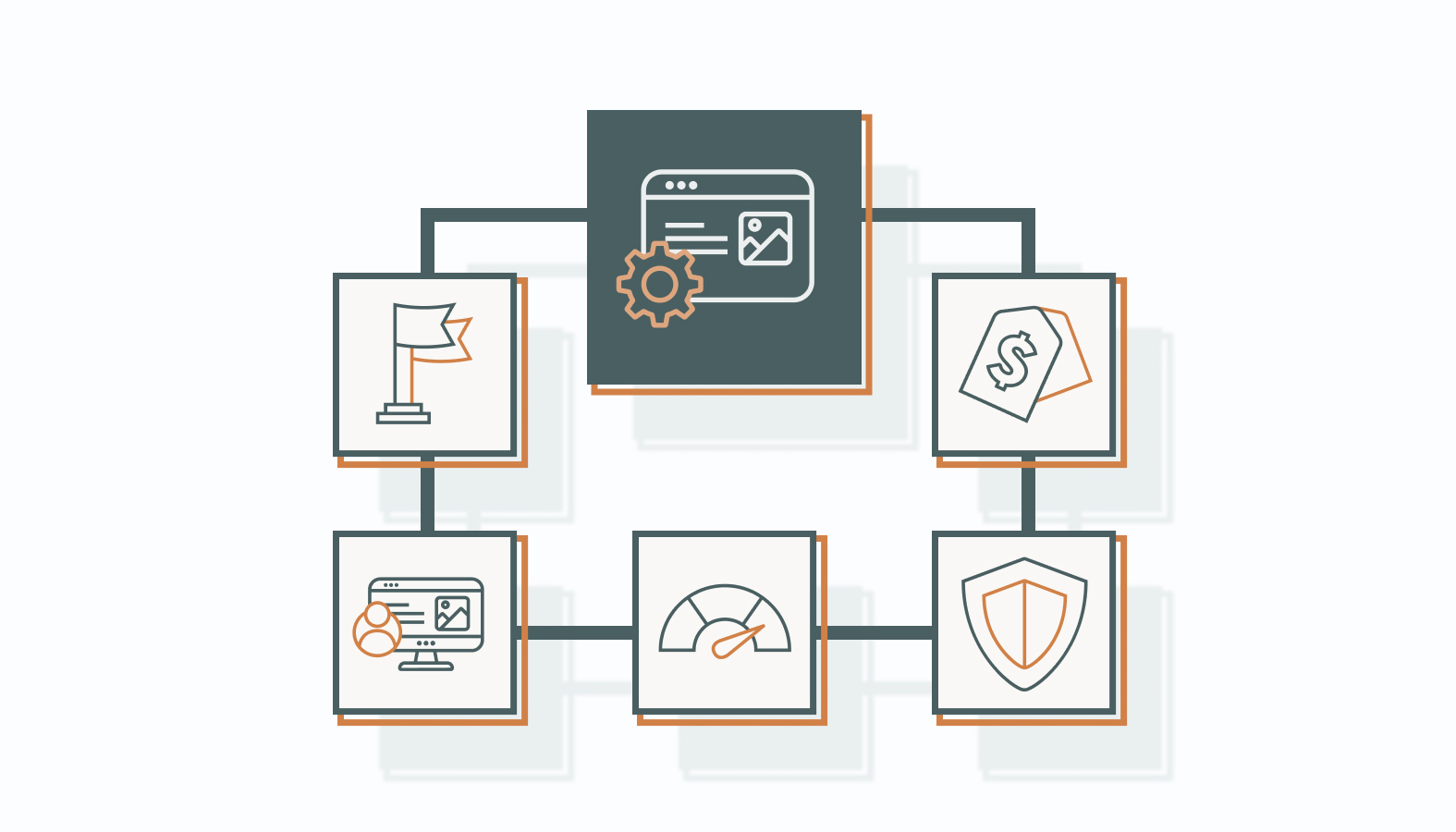Choosing a content management system shouldn’t feel like a guessing game with too many tabs open. But with dozens of platforms promising drag-and-drop ease and “seamless scalability,” it’s easy to get lost chasing features that look shiny but don’t move the needle.
Here’s the reality: your CMS is more than a digital filing cabinet. It’s the infrastructure that supports your brand, speeds up your team, and scales with your growth. The wrong platform slows you down. The right one unlocks efficiency, alignment, and smarter execution across every channel you touch.
In this guide, we’ll explain exactly what makes a CMS work for your business — types, features, implementation tips, and how to think long-term. Let’s get into choosing a platform that works with your strategy, not against it.
Different CMS Types: Use Cases, Pros & Cons
CMS platforms come in various forms, each with unique architectures and use cases:
1) Traditional CMS
This is the most common type, in which the front-end (what users see) and back-end (where content is created and managed) are tightly integrated.
Traditional CMS platforms like WordPress, Joomla, or Drupal allow users to build and manage websites within a single system. They’re built to be user-friendly and quick to set up.
Use Case: Best suited for bloggers, small businesses, and non-technical users who need an all-in-one solution with minimal setup and straightforward content publishing.
Pros:
- Easy to use with built-in themes and plugins
- Great for fast deployment
- Requires minimal technical expertise
- Large support communities and documentation
Cons:
- Limited flexibility for multichannel content delivery
- It can be harder to scale for complex use cases
- Integration with modern tools may be clunky
2) Headless CMS
A headless CMS separates the back-end content repository from the front-end entirely. Content is delivered via APIs to any front-end (website, app, smart device, etc.), giving developers complete control over presentation. Popular platforms include Contentful, Strapi, and Sanity.
Use Case: Ideal for development teams who need to deliver content across multiple platforms — including web, mobile apps, smartwatches, or IoT devices — and require high customization.
Pros:
- Extremely flexible and front-end agnostic
- Perfect for omnichannel content delivery
- Scales well with growing or complex infrastructures
- Faster performance when properly optimized
Cons:
- Requires developers for setup and maintenance
- No visual front-end by default — editors may struggle without custom interfaces
- It can be more expensive with usage-based pricing models
- Initial setup and integration take longer
3) Decoupled CMS
Decoupled CMS is a hybrid model in which the front end and back end are separate but still packaged together. It offers built-in content creation tools and the flexibility to push content to different front ends via APIs.
Examples include Contentstack and Kentico.
Use Case: Great for businesses that need flexibility across platforms but want to retain some editorial convenience without building everything from scratch.
Pros:
- Balanced control between developers and content teams
- Supports multichannel publishing
- More straightforward to customize than traditional CMS
- Faster time-to-market than fully headless solutions
Cons:
- More complex than traditional CMS
- It can be overkill for simple websites
- Still requires technical resources to maximize flexibility
- Costlier than traditional CMS depending on implementation scope
Must-Have Features of Top CMS Platforms
Whether you’re running a small blog or a large e-commerce site, understanding these essential features is the first step in optimizing your digital strategy.
Core Features Every CMS Should Have
Any robust CMS must have these foundational features:
- Intuitive User Interface: A user interface that just works—no guessing, no confusion. When your CMS is intuitive, people get things done faster. Simple navigation means less time spent on training and more time focused on high-value tasks.
Non-technical users can create, update, and manage content without navigating complex settings. The right UI can be a game-changer for team productivity.
- Powerful Content Editing and Management: Content is king, but the tools make it shine. A CMS with robust editing features (like text editors, media management, and version control) lets you handle everything with ease.
Keep your digital assets organized, fresh, and on-brand, ensuring every update aligns with your strategic goals. Managing content has never been this seamless or effective.
- Strong Security Protocols: In the digital age, security is everything. With features like user authentication, data encryption, and access controls, your CMS can safeguard content and maintain the trust of both your team and customers.
Security should not be compromised. A secure CMS should give you peace of mind that your digital assets are well-protected.
- Scalability and High Performance: Your business is growing, and your CMS should grow with it. High performance ensures your site remains fast and responsive, even during peak traffic times.
Scalability lets you expand without a hitch. As you grow, your CMS adapts, keeping your digital presence smooth and efficient.
Cutting-Edge Features in Today’s CMS
The latest CMS platforms are packed with advanced features that supercharge your content strategy and deliver insights that drive performance. These tools transform your digital presence into a strategic asset.
- AI-Driven Content Personalization: AI is reshaping how content connects with users. It enhances engagement and satisfaction by tailoring content to individual preferences and behaviors.
Personalized experiences not only increase user interaction but also boost conversion rates. It’s like having a content strategy that adapts in real time, making every touchpoint with your audience more impactful.
- Multichannel Content Distribution Capabilities: Content doesn’t live in a silo anymore. Your audience is everywhere, and your content needs to be, too.
A CMS with multichannel distribution ensures your content reaches the right eyes, on the right platforms, every time. Whether it’s on mobile, desktop, or social media, you maximize your brand’s reach and visibility across every channel.
- Integrated Analytics and SEO Tools: Understanding what’s working is key. Integrated analytics give you a clear picture of how your content is performing, while built-in SEO tools ensure your content ranks higher on search engines.
This dynamic duo allows you to refine your strategy with real-time data, pushing your content to achieve its maximum potential.
- Automation and Workflow Optimization Features: Repetitive tasks? Let automation handle them. A CMS frees up time and reduces errors by streamlining workflows, from content scheduling to approval processes.
Automation isn’t just about saving time. It ensures your content operations are smoother, faster, and more efficient. This means you can focus on what really matters: strategy.
Leveraging these cutting-edge features transforms your CMS into more than just a tool. It becomes a powerhouse driving both daily operations and long-term success.
Discover How a CMS Can Transform Your Business
Integrating a CMS means moving past the chaos of disjointed systems and into a space where content flows seamlessly across platforms. Let’s break down the real power of a CMS.
Boost Your Daily Operations
A CMS supercharges productivity by simplifying key processes and cutting out inefficiencies.
- Simplify Content Creation and Management: An intuitive CMS allows anyone on your team to create, manage, and update content without the need for coding skills.
Features like drag-and-drop editors and customizable templates give you control, ensuring your content stays fresh and relevant, no matter who’s in charge.
- Improve Team Collaboration and Efficiency: Collaboration becomes frictionless with role-based access, multi-user environments, and real-time editing.
Time is money, regardless of your industry. These tools let your team work seamlessly, ensuring smoother content creation and faster approvals.
- Reduce Maintenance Costs and Effort: No more chasing down IT support for every little update. A CMS automates updates and streamlines maintenance, freeing resources for more strategic tasks. Less effort, less cost, more output.
Strategic Long-Term Gains
A CMS solves today’s problems and supports tomorrow’s growth.
- Elevate Your SEO and Online Presence: CMS platforms have built-in SEO tools that boost your visibility, ensuring your content ranks higher in search results. The more consistently you post, the stronger your online presence, which means more traffic, engagement, and opportunities.
- Scale Seamlessly with Your Business Needs: A CMS grows with you. Whether it’s managing more content or handling increased web traffic, your CMS scales effortlessly, adapting to your expanding digital needs without the added cost or complexity.
- Consistent Branding Everywhere: A CMS helps you keep your brand message consistent. Centralized management ensures that all content, from blog posts to social media updates, carries the same tone and identity, reinforcing your brand’s presence and credibility across platforms.
A well-integrated CMS should be able to optimize today’s workflows while positioning your business for future success.
How to Choose the Right CMS for Your Business
Choosing the right CMS is more than a technical decision. It’s about selecting the tool that will grow with you, adapt to your evolving needs, drive efficiency, and align with your business’s long-term goals.
1) Define Your Needs and Goals
Before exploring CMS options, clarify your needs. Whether you’re boosting user engagement, streamlining content workflow, or optimizing for SEO, your business goals should drive the decision-making process.
Consider the types of content you’ll manage and the volume you anticipate handling. The right CMS should be capable of managing this content effectively now and as your needs expand. Think of it as the foundation for your content strategy, not just a tool.
2) Check Usability and Support
The best CMS is one that everyone can use, from the dev team to content editors. Look for a system with an intuitive interface that streamlines operations without the steep learning curve.
Support is critical, too! Make sure you have access to responsive customer service and a thriving community forum.
When problems arise, you’ll want to solve them fast, so having these resources in your corner is key.
3) Assess Scalability and System Performance
Your CMS needs to keep up as your business scales.
Does it handle increased traffic?
Can it manage an expanding content library?
Test its performance under peak loads to ensure it delivers a smooth experience, no matter how big your business gets. A scalable CMS ensures you won’t hit a wall as your digital presence grows.
4) Ensure Robust Security and Compliance
Security should never be an afterthought. Ensure your CMS offers top-tier protection with encryption, secure user authentication, and regular updates to fend off potential threats.
If you handle sensitive data, ensure the system complies with industry regulations and data protection laws.
The right CMS safeguards your content and the integrity of your entire business.
5) Balance Costs and Long-Term Strategy
Lastly, don’t overlook the financials.
Factor in the CMS’s total cost of ownership: upfront costs, ongoing maintenance, and any additional features you might need. And make sure it aligns with your future business goals.
A CMS is an investment, so you want to ensure it grows with you and provides lasting value that supports your strategic vision.
Take the time to evaluate these factors, and you’ll have a CMS that will set you up for success today and in the years to come.
Essential Guidelines for Effective CMS Implementation
Successfully implementing a CMS goes far beyond installing software. It requires clear planning, proactive involvement, and continuous support to ensure long-term success.
With the right approach, a CMS can significantly improve your business’s digital operations and content management.
Start with a Strategic Plan
Effective CMS implementation begins with setting clear goals.
What do you want the system to achieve within your organization?
Define the project’s scope, outlining what the CMS needs to support in terms of content management, workflows, and collaboration.
Involving key stakeholders early in the process is critical to understanding varying needs across departments. Gaining their buy-in ensures smoother adoption, making the transition seamless and less disruptive.
Tailor the CMS Selection to Your Needs
Once the goals are clear, focus on selecting the right CMS. Don’t just look at current needs. Evaluate its growth potential.
Will it scale as your organization expands, and will it accommodate new features and evolving tech demands?
Picking a CMS that is flexible enough to evolve with your business ensures that it remains a valuable long-term investment.
Conduct Pilot Testing and Collect Feedback
Before going live, launch a pilot test with a small, select group of users. This trial run helps identify any issues or limitations in real time, allowing you to resolve them before full-scale implementation.
Create a feedback loop, allowing users to provide insights on usability, issues, or features they may need. Continuously gathering and addressing this feedback improves the system’s functionality and user satisfaction.
Provide Comprehensive Training and Ongoing Support
No matter how intuitive your CMS is, training is essential. Develop training programs tailored to various user roles, such as administrators, content creators, marketers, and developers, so everyone can effectively leverage the CMS.
Additionally, long-term training support, like refresher courses or access to online resources, should be considered to keep users informed about updates and best practices.
Plan Data Migration and System Integration Carefully
A successful CMS rollout depends on smooth data migration. Start by cleaning, mapping, and testing data to ensure consistency and integrity.
Integrating the CMS with other business systems, such as CRM, ERP, or marketing tools, ensures workflows run seamlessly and eliminates redundant manual tasks. Integration optimizes the CMS’s capabilities and helps streamline your entire tech ecosystem.
With the right plan, training, and support in place, your CMS will become a powerful tool driving operational efficiency and content success across your organization.
Maximizing Your Business Potential with the Right CMS
Choosing the right CMS is a game-changer for content excellence. It streamlines operations and provides a solid foundation for growth, brand consistency, and long-term success.
As your business evolves, regularly reassessing and adapting your CMS strategies ensures that you stay agile and aligned with your goals.
This ongoing commitment to content excellence helps you manage your content and enhances your connection with your audience. As a result, it positions your business for sustained success in a fast-changing digital world.
Take the Next Step with Us
A strategic plan is just the first step — execution is where success truly unfolds. If you’re ready to move beyond planning and need the right expertise to implement your CMS effectively, let’s talk.
Schedule a candid conversation with one of our experts and see how we can elevate your content strategy with proven innovative tactics. Our fractional marketing expertise ensures your CMS is implemented correctly, optimizing your business for the future.










